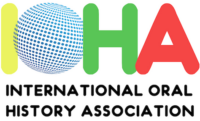
Transcribing Oral History by Teresa Bergen and published by Routledge, offers a comprehensive guide to the transcription of qualitative interviews, an often richly debated practice within oral history. Beginning with an introduction to the field and an overview of the many disciplines that conduct and transcribe interviews, the book goes on to offer practical advice to those looking to use transcription within their own projects. A helpful how-to section covers technology, style guides, ways to format transcripts and troubleshoot the many problems that can arise. In addition to the practicalities of transcription itself, the book encourages the reader to consider legal and ethical issues, and the effects of troubling audio on the transcriptionist. It explains how scholars can turn recorded interviews and transcripts into books, films and museum exhibits, enabling the reader to understand the wider concerns surrounding transcription as well as the practical uses to which it can be put.
Based upon the author’s personal experience as a freelance transcriptionist and interviews with more than 30 professionals working around the world in the oral history and qualitative research fields, this is an indispensable guide for those involved in interviews and transcription at any level of an oral history project, including historians, transcriptionists, interviewers, project administrators, archivists, researchers and students.

Practicing Oral History among Refugees and Host Communities by Marcella Hoffman and also published by Routledge, provides a comprehensive and practical guide to applied oral history with refugees, teaching the reader how to use applied, contemporary oral history to help provide solutions to the ‘mega-problem’ that is the worldwide refugee crisis.
The book surveys the history of the practice and explains its successful applications in fields from journalism, law and psychiatry to technology, the prevention of terrorism and the design of public services. It defines applied oral history with refugees as a field, teaching rigorous, accessible methodologies for doing it, as well as outlining the importance of doing the same work with host communities. The book examines important legal and ethical parameters around this complex, sensitive field, and highlights the cost-effective, sustainable benefits that are being drawn from this work at all levels. It outlines the sociopolitical and theoretical frameworks around such oral histories, and the benefits for practitioners’ future careers. Both in scope and approach, it thoroughly equips readers for doing their own oral history projects with refugees or host communities, wherever they are.
Using innovative case studies from seven continents and from the author’s own work, this manual is the ideal guide for oral historians and those working with refugees or host communities.
